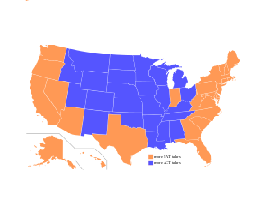What does your location have to do with whether you take the SAT or ACT?
A lot, as it turns out.
Many factors can have a role in affecting which test you take, including the admissions policies of the colleges you apply to, as well as test requirements for graduation some high schools make. But even behind these school requirements and recommendations, often your geographic location in the US plays the major role.
The long established, key trend is that the ACT is more popular in non-Coastal States of the country whereas the SAT is more popular in Coastal States. This Coastal/Non-Coastal State divide has become firm with time, which can create the perception that there is only one test to consider taking in a given State. (Also compare this trend to the geographic trend for the TASC and HiSET high school equivalency tests.)
Even in observing this trend, it is also worth remembering that most colleges in the US now except either the SAT or ACT (although different college programs may have more specific policies). The two tests are also now in less of a battle over superiority or reputation, and are commonly recognized to each have their own set of strengths and weaknesses.
Geography is just one interesting variable to take into account in your decision to take the SAT and ACT, but clearly one that warrants time and reflection when making your decision. See our new free eBook to learn more important details to use in comparing the SAT, ACT, and Redesigned SAT:
Go to Comparison of the SAT, rSAT, and ACT now.
Image Credit: wikimedia commons.










